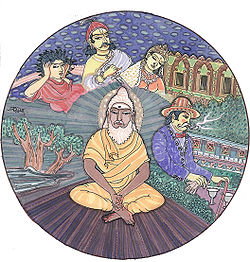
Jiva
Encyclopedia

Hinduism
Hinduism is the predominant and indigenous religious tradition of the Indian Subcontinent. Hinduism is known to its followers as , amongst many other expressions...
and Jainism
Jainism
Jainism is an Indian religion that prescribes a path of non-violence towards all living beings. Its philosophy and practice emphasize the necessity of self-effort to move the soul towards divine consciousness and liberation. Any soul that has conquered its own inner enemies and achieved the state...
, a jiva is a living being, or more specifically, the immortal essence of a living organism (human, animal, fish or plant etc.) which survives physical death. It has a very similar usage to atma
Atman (Hinduism)
Ātman is a Sanskrit word that means 'self'. In Hindu philosophy, especially in the Vedanta school of Hinduism it refers to one's true self beyond identification with phenomena...
, but whereas atma refers to "the cosmic self", jiva is used to denote an individual 'living entity' or 'living being' specifically. The terms Paramatma and jivatma are used to avoid confusion.
The word itself originates from the Sanskrit
Sanskrit
Sanskrit , is a historical Indo-Aryan language and the primary liturgical language of Hinduism, Jainism and Buddhism.Buddhism: besides Pali, see Buddhist Hybrid Sanskrit Today, it is listed as one of the 22 scheduled languages of India and is an official language of the state of Uttarakhand...
Jivás, with the root jīv- 'to breathe'. It has the same Indo-European root as the Latin word Vivus: "alive".
Definition
In the Bhagavad GitaBhagavad Gita
The ' , also more simply known as Gita, is a 700-verse Hindu scripture that is part of the ancient Sanskrit epic, the Mahabharata, but is frequently treated as a freestanding text, and in particular, as an Upanishad in its own right, one of the several books that constitute general Vedic tradition...
, the jiva is described as immutable, eternal
Eternity
While in the popular mind, eternity often simply means existence for a limitless amount of time, many have used it to refer to a timeless existence altogether outside time. By contrast, infinite temporal existence is then called sempiternity. Something eternal exists outside time; by contrast,...
, numberless and indestructible. It is said not to be a product of the material world (Prakrti
Prakrti
Prakrti or Prakriti or Prakruti means "nature". It is, according to Hindus, the basic nature of intelligence by which the Universe exists and functions. It is described in Bhagavad Gita as the "primal motive force". It is the essential constituent of the universe and is at the basis of all the...
), but of a higher 'spiritual' nature. At the point of physical death the jiva takes a new physical body depending on the karma
Karma
Karma in Indian religions is the concept of "action" or "deed", understood as that which causes the entire cycle of cause and effect originating in ancient India and treated in Hindu, Jain, Buddhist and Sikh philosophies....
and the individual desires and necessities of the particular jiva in question.
Goals
Some Jain and Hindu scriptures describe the ultimate goal of the jiva as being one or more of the following (depending on the particular philosophical tradition):- 'liberation' from material existence (mokshaMokshaWithin Indian religions, moksha or mukti , literally "release" , is the liberation from samsara and the concomitant suffering involved in being subject to the cycle of repeated death and reincarnation or rebirth.-Origins:It is highly probable that the concept of moksha was first developed in...
) - obtaining pure love of GodGodGod is the English name given to a singular being in theistic and deistic religions who is either the sole deity in monotheism, or a single deity in polytheism....
(bhaktiBhaktiIn Hinduism Bhakti is religious devotion in the form of active involvement of a devotee in worship of the divine.Within monotheistic Hinduism, it is the love felt by the worshipper towards the personal God, a concept expressed in Hindu theology as Svayam Bhagavan.Bhakti can be used of either...
) - becoming liberated from the happiness and distress of the world, while still being existent within it (jivanmuktaJivanmuktaJivanmukta is someone who, in the Advaita philosophy of Hinduism, has attained nirvikalpa samadhi - the realization of the Self, Parasiva - and is liberated from rebirth while living in a human body....
).
See also
- Ātman (Hinduism)Ātman (Hinduism)Ātman is a Sanskrit word that means 'self'. In Hindu philosophy, especially in the Vedanta school of Hinduism it refers to one's true self beyond identification with phenomena...
- Atman (Jainism)Atman (Jainism)The Atman is a philosophical term used within Jainism to identify the soul. It is one's true self beyond identification with the phenomenal reality of worldly existence...
- BrahmanBrahmanIn Hinduism, Brahman is the one supreme, universal Spirit that is the origin and support of the phenomenal universe. Brahman is sometimes referred to as the Absolute or Godhead which is the Divine Ground of all being...
- ConsciousnessConsciousnessConsciousness is a term that refers to the relationship between the mind and the world with which it interacts. It has been defined as: subjectivity, awareness, the ability to experience or to feel, wakefulness, having a sense of selfhood, and the executive control system of the mind...
- TirthankarTirthankarIn Jainism, a ' |ford]]-Maker", ) is a human being who achieves moksa through asceticism and who then becomes a role-model and teacher for those seeking spiritual guidance....
- VedantaVedantaVedānta was originally a word used in Hindu philosophy as a synonym for that part of the Veda texts known also as the Upanishads. The name is a morphophonological form of Veda-anta = "Veda-end" = "the appendix to the Vedic hymns." It is also speculated that "Vedānta" means "the purpose or goal...

